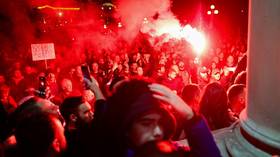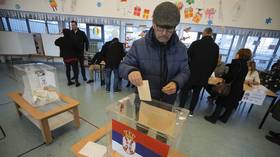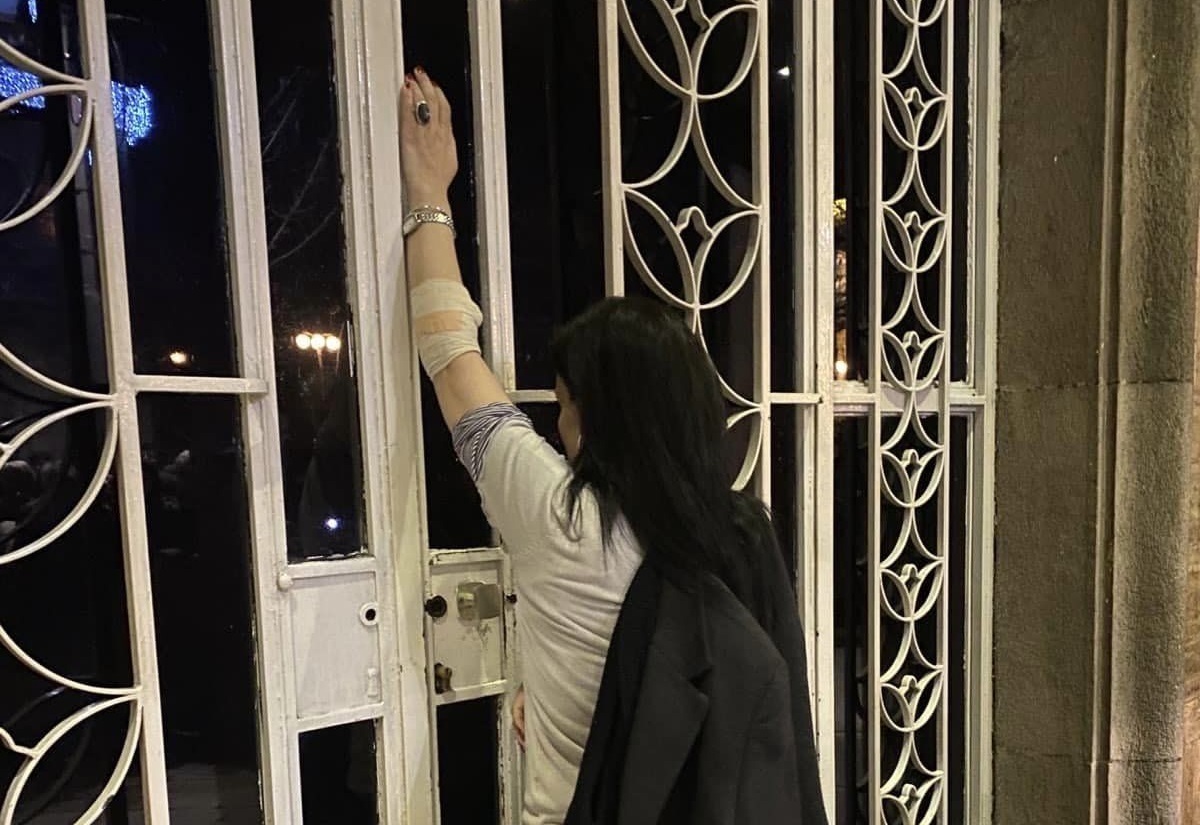
Opposition activists forced their way into Belgrade city hall after claiming a municipal election was rigged

Opposition supporters in front of Belgrade’s city council building, December 24, 2023. © OLIVER BUNIC / AFP
Opposition forces in Serbia breached Belgrade’s city hall amid mass protests on Sunday. They claim the recent municipal election in the capital, won by the ruling party, was rigged. Senior national officials have described the protests as an attempted “color revolution,” and said they had been forewarned by Russia.
Mayorship
Belgrade is home to roughly a quarter of the Balkan nation’s population of over 6.6 million. The office of its mayor is viewed as one of the most important in Serbia.
Members of the city council, who vote the mayor in, were elected on December 17 – the same day as a national election and several municipal votes were held.
The ruling Serbian Progressive Party (SNS) of President Aleksandar Vucic won the most seats in the Belgrade City Assembly. The opposition Serbia Against Violence (SPN) alliance claims the outcome was achieved through voter fraud.
Early violence
In the week that followed the elections, the opposition staged several rallies in Belgrade, some of them marred by violence.

Read more
During a demonstration in front of the Republican Election Commission last Monday, leading Serbian statistician Milorad Kovacevic and several of his associates were reportedly attacked by activists. Police seized several knives and bats from protesters, local media said.
Election officials react
The Election Commission denounced the violence and claimed the rally was an attempt to disrupt its activities. The head of the commission, Vladimir Dimitrijevic, expressed hope that it was an isolated incident and that any future attempts to challenge the election result would remain legal.
The body investigated opposition claims that ‘phantom voters’ had been allowed to cast ballots in Belgrade, but reported on Sunday that it had found no evidence that the election had been “stolen.”
Sunday riot
On Sunday evening, hundreds of pro-opposition demonstrators gathered in the center of Belgrade after being rallied by the SPN. Opposition leader Marinika Tepic, who declared a hunger strike last Monday and claims to be living on IV infusions, was barred from entering the Election Commission building. Meanwhile, an improvised stage was erected near the presidential residence, with speakers and performers whipping up the crowd.

Marinika Tepic at the entrance of the Election Commission. © Facebook / Marinika Tepic
Later in the evening, some activists stormed city hall, claiming they were seeking “to liberate the institutions.” The police intervened and drove them out.
Aleksandar Sapic, head of the temporary city administration, shared images of the damage caused by the rioters in the historic building, calling it “irreparable.” He declared that Serbia must be protected from the use of violence for political gain. He used the term “Maidanization,” referring to the 2014 armed coup in Kiev, which set the stage for the current hostilities between Russia and Ukraine.
‘Color revolution’
President Vucic denounced the riot, calling it an attempted “color revolution” and claiming that a foreign nation had warned his government about the threat beforehand. Prime Minister Ana Brnabiс thanked the Russian special services for providing intelligence to Belgrade.
The term ‘color revolution’ is often applied to the mass uprisings by ostensibly pro-democratic political forces in the 1990s and 2000s, including in Yugoslavia in 2000. Russia and some other nations perceive the wave as masterminded by the West to further its geopolitical goals, and executed through NGOs, media outlets, and parties funded by the US and its allies.
The Vucic government has been presented with a dilemma amid the current confrontation between Russia and the West. It is seeking EU membership for Serbia, which would require the realignment of Belgrade’s foreign policy with that of Brussels. However, Vucic has rejected Western calls to cut ties with Russia and join the US-led sanctions campaign against Moscow.
READ MORE: Serbia thanks Russia for ‘color revolution’ warning
Responding to the turmoil in Belgrade, Russian Foreign Ministry spokeswoman Maria Zakharova claimed it was an “obvious attempt by the collective West to destabilize the situation in the country through ‘maidan coups’,” according to RIA Novosti.









